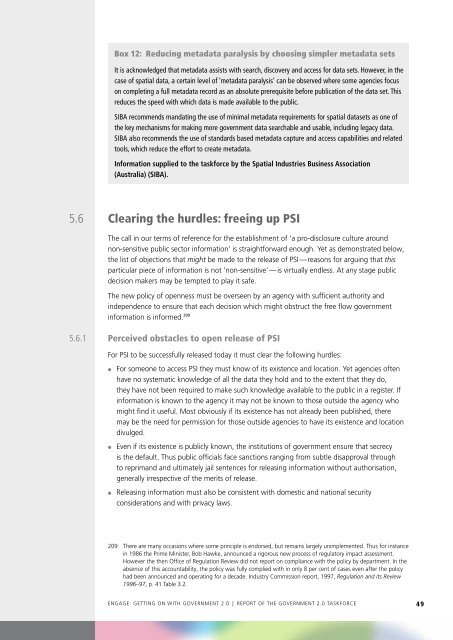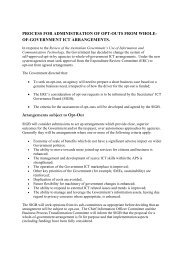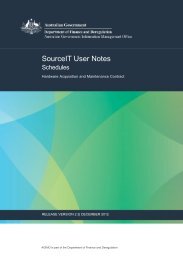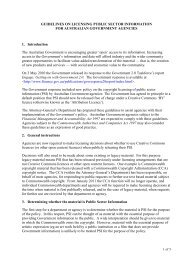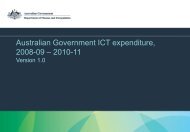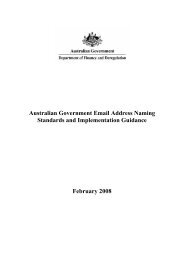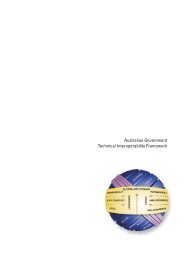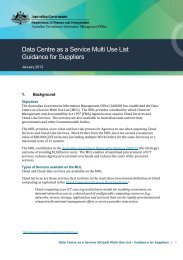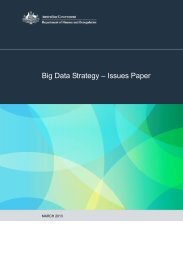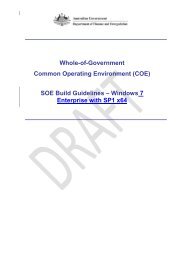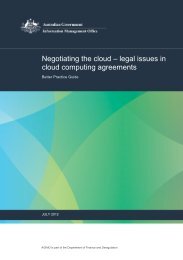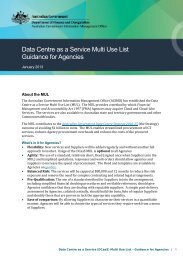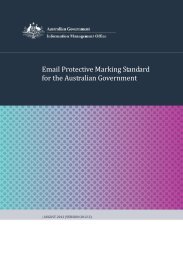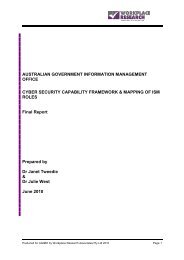Getting on with Government 2.0 - Department of Finance and ...
Getting on with Government 2.0 - Department of Finance and ...
Getting on with Government 2.0 - Department of Finance and ...
Create successful ePaper yourself
Turn your PDF publications into a flip-book with our unique Google optimized e-Paper software.
Box 12: Reducing metadata paralysis by choosing simpler metadata sets<br />
It is acknowledged that metadata assists <strong>with</strong> search, discovery <strong>and</strong> access for data sets. However, in the<br />
case <strong>of</strong> spatial data, a certain level <strong>of</strong> ‘metadata paralysis’ can be observed where some agencies focus<br />
<strong>on</strong> completing a full metadata record as an absolute prerequisite before publicati<strong>on</strong> <strong>of</strong> the data set. This<br />
reduces the speed <strong>with</strong> which data is made available to the public.<br />
SIBA recommends m<strong>and</strong>ating the use <strong>of</strong> minimal metadata requirements for spatial datasets as <strong>on</strong>e <strong>of</strong><br />
the key mechanisms for making more government data searchable <strong>and</strong> usable, including legacy data.<br />
SIBA also recommends the use <strong>of</strong> st<strong>and</strong>ards based metadata capture <strong>and</strong> access capabilities <strong>and</strong> related<br />
tools, which reduce the effort to create metadata.<br />
Informati<strong>on</strong> supplied to the taskforce by the Spatial Industries Business Associati<strong>on</strong><br />
(Australia) (SIBA).<br />
5.6 Clearing the hurdles: freeing up PSI<br />
<br />
The call in our terms <strong>of</strong> reference for the establishment <strong>of</strong> ‘a pro-disclosure culture around<br />
n<strong>on</strong>-sensitive public sector informati<strong>on</strong>’ is straightforward enough. Yet as dem<strong>on</strong>strated below,<br />
the list <strong>of</strong> objecti<strong>on</strong>s that might be made to the release <strong>of</strong> PSI — reas<strong>on</strong>s for arguing that this<br />
particular piece <strong>of</strong> informati<strong>on</strong> is not ‘n<strong>on</strong>-sensitive’ — is virtually endless. At any stage public<br />
decisi<strong>on</strong> makers may be tempted to play it safe.<br />
The new policy <strong>of</strong> openness must be overseen by an agency <strong>with</strong> sufficient authority <strong>and</strong><br />
independence to ensure that each decisi<strong>on</strong> which might obstruct the free flow government<br />
informati<strong>on</strong> is informed. 209<br />
5.6.1 Perceived obstacles to open release <strong>of</strong> PSI<br />
For PSI to be successfully released today it must clear the following hurdles:<br />
●●<br />
●●<br />
●●<br />
For some<strong>on</strong>e to access PSI they must know <strong>of</strong> its existence <strong>and</strong> locati<strong>on</strong>. Yet agencies <strong>of</strong>ten<br />
have no systematic knowledge <strong>of</strong> all the data they hold <strong>and</strong> to the extent that they do,<br />
they have not been required to make such knowledge available to the public in a register. If<br />
informati<strong>on</strong> is known to the agency it may not be known to those outside the agency who<br />
might find it useful. Most obviously if its existence has not already been published, there<br />
may be the need for permissi<strong>on</strong> for those outside agencies to have its existence <strong>and</strong> locati<strong>on</strong><br />
divulged.<br />
Even if its existence is publicly known, the instituti<strong>on</strong>s <strong>of</strong> government ensure that secrecy<br />
is the default. Thus public <strong>of</strong>ficials face sancti<strong>on</strong>s ranging from subtle disapproval through<br />
to reprim<strong>and</strong> <strong>and</strong> ultimately jail sentences for releasing informati<strong>on</strong> <strong>with</strong>out authorisati<strong>on</strong>,<br />
generally irrespective <strong>of</strong> the merits <strong>of</strong> release.<br />
Releasing informati<strong>on</strong> must also be c<strong>on</strong>sistent <strong>with</strong> domestic <strong>and</strong> nati<strong>on</strong>al security<br />
c<strong>on</strong>siderati<strong>on</strong>s <strong>and</strong> <strong>with</strong> privacy laws.<br />
209 There are many occasi<strong>on</strong>s where some principle is endorsed, but remains largely unimplemented. Thus for instance<br />
in 1986 the Prime Minister, Bob Hawke, announced a rigorous new process <strong>of</strong> regulatory impact assessment.<br />
However the then Office <strong>of</strong> Regulati<strong>on</strong> Review did not report <strong>on</strong> compliance <strong>with</strong> the policy by department. In the<br />
absence <strong>of</strong> this accountability, the policy was fully complied <strong>with</strong> in <strong>on</strong>ly 8 per cent <strong>of</strong> cases even after the policy<br />
had been announced <strong>and</strong> operating for a decade. Industry Commissi<strong>on</strong> report, 1997, Regulati<strong>on</strong> <strong>and</strong> its Review<br />
1996–97, p. 41 Table 3.2.<br />
Engage: <str<strong>on</strong>g>Getting</str<strong>on</strong>g> <strong>on</strong> <strong>with</strong> <strong>Government</strong> <strong>2.0</strong> | report <strong>of</strong> the government <strong>2.0</strong> taskforce<br />
49


